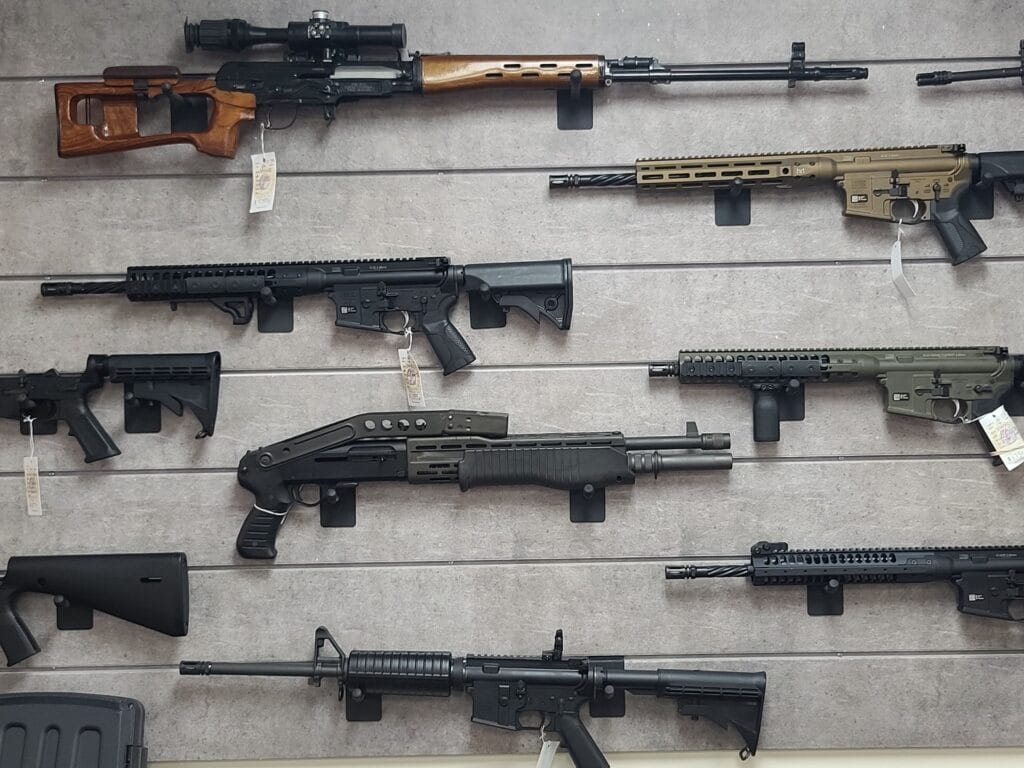There are two candidates already officially in the 2024 Republican presidential primary. But this week I’m more interested in the major contender who isn’t in yet.
Florida Governor Rob Desantis is making waves on gun policy. He announced a new plan to pressure big banks into maintaining business with gun companies and other industries they have previously shown hostility towards. That comes a short time after he promised to pass permitless carry.
Guns may not seem like an area a Florida governor would have to worry about in a Republican primary. But I explain why that’s not really the case anymore and why it makes sense that Desantis would want to take some action in this area before getting into the primary.
Meanwhile, Contributing Writer Jake Fogleman takes a detailed look at the first-of-its-kind ruling out of Oregon. State preemption laws have been used as a bulwark against local gun-control laws for decades. But now they may be used against “Second Amendment sanctuaries” as well.
And I was on CNN this week talking about the MSU shooter, his earlier gun charges, and what part of his background stuck out as a major warning sign. You can watch the interview over on Twitter.
Plus, author Mark W. Smith provides an overview of what the legal landscape looks like in the wake of Bruen.

Analysis: Desantis Moves to Shore Up His Right Flank on Guns [Member Exclusive]
By Stephen Gutowski
Florida Governor Ron Desantis (R.) moved to address another issue gun-rights activists care about this week in a clear attempt to bolster his Second Amendment credentials.
He announced on Tuesday that his administration would attempt to use the Florida government’s considerable spending power to pressure big banks into continuing to do business with gun companies. Alongside the state’s top legislators, Desantis promised new legislation that would bar major financial institutions from doing business with the state government if they refuse to do business with companies or individuals over their political beliefs. He singled out how banks have tried to affect what guns are made and sold by denying services to gun companies.
The move naturally incorporates guns into Desantis’s strategy of using state power to push back against political activism by major corporations. It fits well with the governor’s overall strategy.
“This also ends up going when a bank evaluates different companies,” he said. “They’ll use things called ‘social credit scores.’ This is actually something actually more likely to find use in the CCP. It doesn’t have use in the US of A. They’re ranking you about what you’re doing to basically conform your behavior to their ideological imperatives. And that’s not something that is acceptable here in the state of Florida.”
Certainly, this use of government power to punish private companies is likely to turn off more libertarian-minded voters. But the last several years have shown most Republican voters are more interested in finding ways to combat “woke” corporate policies than the libertarian ideal of small government. Showing those voters that you’re fighting the people they believe are trying to fight them is likely to win many over.
At least, Desantis is betting on that idea.
Going after banks for dropping gun businesses isn’t the only thing Desantis is doing to boost his bonafides. He’s also committed to signing permitless carry, often called Constitutional carry, into law this year as well.
These two policies are more important to Desantis’s chances in a potential Republican presidential primary than it may seem at first glance. Florida has a reputation for being pro-gun. It’s often called the “gunshine state.”
However, the most recent significant gun reforms came in 2018 when state Republicans passed new restrictions in the wake of the Parkland shooting. At a time when other red states have been repealing most of their restrictions, Florida still has a waiting period for gun purchases and bans on AR-15s for anyone under 21 years old.
It is among the last states where Republicans have total control of the state government that still requires a permit for concealed carry.
Now, Desantis hasn’t added significant restrictions as governor. But he hasn’t removed any to this point either. His recent quote on supporting permitless carry sums up how he’s approached the issue with little urgency.
“Basically, this was something that I’ve always supported,” DeSantis said, according to The Tampa Bay Times. “The last two years, it was not necessarily a priority for the legislative leadership. But we’ve been talking about it, and he’s (Renner’s) pledged publicly that’s moving forward, and it’ll be something that will be done in the regular session.”
Alongside a recent misstep in trying to quietly ban guns from one of his speaking events, this lack of accomplishments leaves him vulnerable to potential competitors who’ve acted more aggressively. Georgia Governor Brian Kemp (R.) got permitless carry through ahead of his reelection last year. Texas Governor Greg Abbott (R.) did permitless carry, a banking law similar to what Desantis is proposing, and a slate of other novel gun-rights reforms too.
Either would have space to go after Desantis on guns. That is… if they run.
Former President Donald Trump (R.), who is already in the race, has more of a mixed record on guns. He didn’t get much done legislatively on firearms. He has spoken to the NRA every year since 2015 but has also expressed openness to taking potentially dangerous people’s guns and doing due process later. He declared gun stores an essential business during the early days of the pandemic, but he also unilaterally instituted the bump stock ban, which the Fifth Circuit recently ruled is unconstitutional.
Of course, Trump also appointed two of the six Supreme Court justices who were in the majority of the New York State Rifle and Pistol Association v. Bruen ruling. That’s easily his most significant accomplishment on guns while in office.
If Desantis is able to follow through on permitless carry and his banking proposal, it won’t put him at the top of the pro-gun Republican heap. But it will go a long way toward shoring up his right flank on guns. That will be important if he does enter the race, as everyone expects he will.
Podcast: Author Mark W. Smith on the Post-Bruen Legal Landscape [Member Early Access]
By Stephen Gutowski
We’re doing another unique episode this week.
Instead of exploring a specific story from the week, we’re taking a step back and looking at the state of the legal fight over guns. That’s why I reached out to one of the best legal commentators out there: Mark W. Smith. He is an author, lawyer, and host of The Four Boxes Diner on YouTube.
Smith gives us the state of play around gun restrictions in federal courts. He said there has been more significant movement from the courts in the seven months since SCOTUS handed down a decision in Bruen than there had been in the decade-plus between it and the landmark Heller decision. And he thinks things are just getting started.
He believes the Supreme Court will likely take up multiple Second Amendment cases over its next term. Smith said they are likely to settle some questions around prohibited person restrictions. But he noted the Court usually takes up cases as a means to lay out best practices for deciding future cases as well. So, the justices are likely to look for cases where they can hand down a decision that applies well beyond the merits of the case.
Smith also goes over some emerging arguments for how certain modern gun restrictions, such as magazine bans, can survive Bruen scrutiny and explains why he believes they don’t hold water.
Plus, Contributing Writer Jake Fogleman and I discuss Florida Governor Ron Desantis’s effort to keep big banks from dropping gun companies.
You can listen to the episode on your favorite podcasting app or by clicking here. Video of the show is also available on our YouTube channel. Reload Members get early access on Sunday. Everyone else will be able to listen on Monday.
Come on the Podcast
One of the many perks of a Reload membership is the opportunity to appear on the podcast. We’ve had a lot of people on the show from all kinds of backgrounds. It’s one of my favorite segments since it gives us all a better insight into the community that makes this publication possible. If you want to come on the show, just reply to this email and let me know!

Analysis: Oregon Ruling Adds a New Wrinkle to the Preemption Debate [Member Exclusive]
By Jake Fogleman
Traditionally whenever a local gun law has been struck down in court under a state preemption statute, it’s usually the result of a left-leaning locality attempting to pass gun restrictions that the state government would not otherwise be willing to pass. A new ruling out of Oregon this week demonstrates that’s not always the case.
A three-judge panel for the Oregon Court of Appeals ruled against a Columbia County ordinance on Wednesday. The county’s “Second Amendment Sanctuary” ordinance attempted to prevent local enforcement of all state and federal gun laws. The panel ruled it violated Oregon’s firearm preemption statute, which generally prevents localities from enacting their own gun regulations.
“The Ordinance, with limited exception, purports to nullify all firearm regulations enacted by the Legislative Assembly,” Judge Douglas Tookey wrote on behalf of the court. “If allowed to stand, it would, effectively, create a ‘patchwork quilt’ of firearms laws in Oregon, where firearms regulations that applied in some counties would not apply in Columbia County, which is what ORS 166.170 was enacted to avoid.”
The ruling adds a new level of complexity to the ongoing debate over gun regulation and local control. It demonstrates that gun-rights advocates can no longer count on preemption to just be a bulwark against gun-control laws. Sometimes, it can actively cut against their own interests too.
The movement to secure state preemption statutes was a hard-fought win for the gun-rights movement. It was primarily inspired by restrictions, such as total handgun bans, that various municipalities began passing in the late 20th century. As a result, gun-rights groups like the NRA and grassroots activists around the country began pushing for state legislation to bar cities and counties from passing gun laws that were more restrictive than state law. At the apex of the movement, 43 states had passed laws preempting local regulation over most aspects of firearm ownership and use.
On the other hand, the Second Amendment Sanctuary movement is a relatively recent phenomenon, but it has begun to spread like wildfire across much of the country. It has its roots in mid-90s resistance to federal gun control by local sheriffs but truly started in earnest in Illinois in 2018. Since then, an estimated 1,900 counties across the country have become some form of Second Amendment Sanctuary due to a local resolution or state law.
While most ordinances are primarily symbolic and predominately surfaced in response to the impending threat of new gun laws, some, like the one in Columbia County, are far more expansive and actively seek to nullify existing state or federal gun laws. Those resolutions and ordinances could run into trouble if the same legal argument used in Oregon is applied to Second Amendment Sanctuaries in other states with a state preemption law on the books.
But that also creates a problem for the other side of the gun debate. Gun-control advocates have traditionally been steadfastly opposed to state preemption laws. They typically fight to get them repealed where possible and often encourage cities and counties to pass their own regulatory schemes for gun ownership regardless.
“When it comes to gun violence, local laws serve the important purpose of addressing the unique issues and dangers facing each different community,” the website for the gun control group Giffords reads. “When a higher level of government takes regulatory power from a lower level, it can create a dangerous gap between the people passing laws and those living with them every day.”
It also states that the group’s legislative goals surrounding preemption are “to resist the expansion of and repeal preemption laws in states that already have them and resist their enactment in states that do not have them.” Likewise, the group Everytown for Gun Safety says, “Preemption laws lead to dangerous and illogical results.”
Yet those same groups participated in the legal fight against Columbus County, Oregon’s sanctuary ordinance. Everytown Law intervened in the litigation to represent four residents who challenged the regulation, and the Giffords Law Center filed an amicus brief supporting striking it down. In other words, the groups used one policy they oppose to help strike down another policy they oppose.
If it begins to take root elsewhere, the legal argument used to strike down the Oregon ordinance creates a catch-22 for both sides of the gun debate. The concept of state preemption and the idea of local control over firearms regulation, in either direction, exist in natural tension. This will be a development to watch moving forward, as the political fights over preemption and the movement of local resistance to gun control laws aren’t going away anytime soon.
On the preemption front, the cities of Philadelphia and Pittsburgh routinely attempt to probe Pennsylvania’s preemption law every couple of years. Now, cities like Columbus and Cincinnati are in legal fights to do the same in Ohio.
Virginia substantially weakened its preemption statute in 2020 by allowing new local restrictions to be placed on where concealed carry permit holders can carry a firearm. In 2021, Colorado became the first state in the country to repeal state preemption, which had been in place since 2003. And this year, lawmakers in Washington and Vermont are considering their own preemption repeal efforts.
Meanwhile, there’s no shortage of local jurisdictions willing to take a stand against what they see as unconstitutional gun-control laws, as indicated by the mass resistance demonstrated by various counties to the Illinois “assault weapon” ban.
Hashing out the new equilibrium between state regulation and local autonomy over gun rights will likely take many more lawsuits.
That’s it for now.
I’ll talk to you all again soon.
Thanks,
Stephen Gutowski
Founder
The Reload







